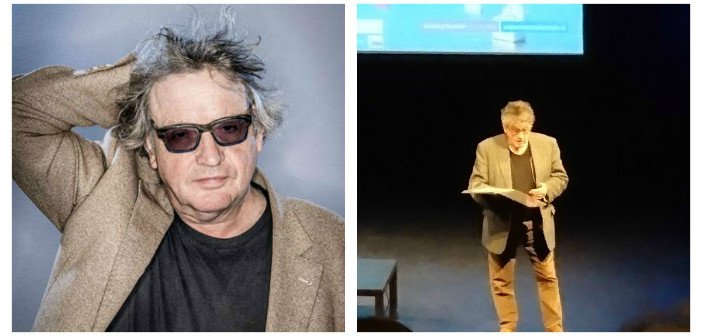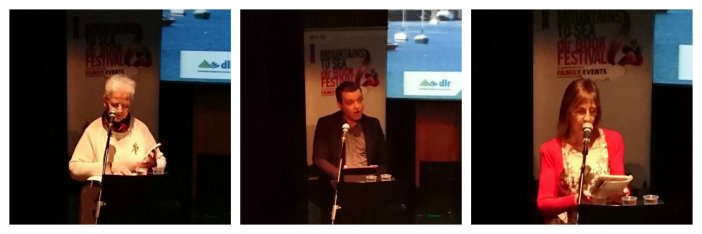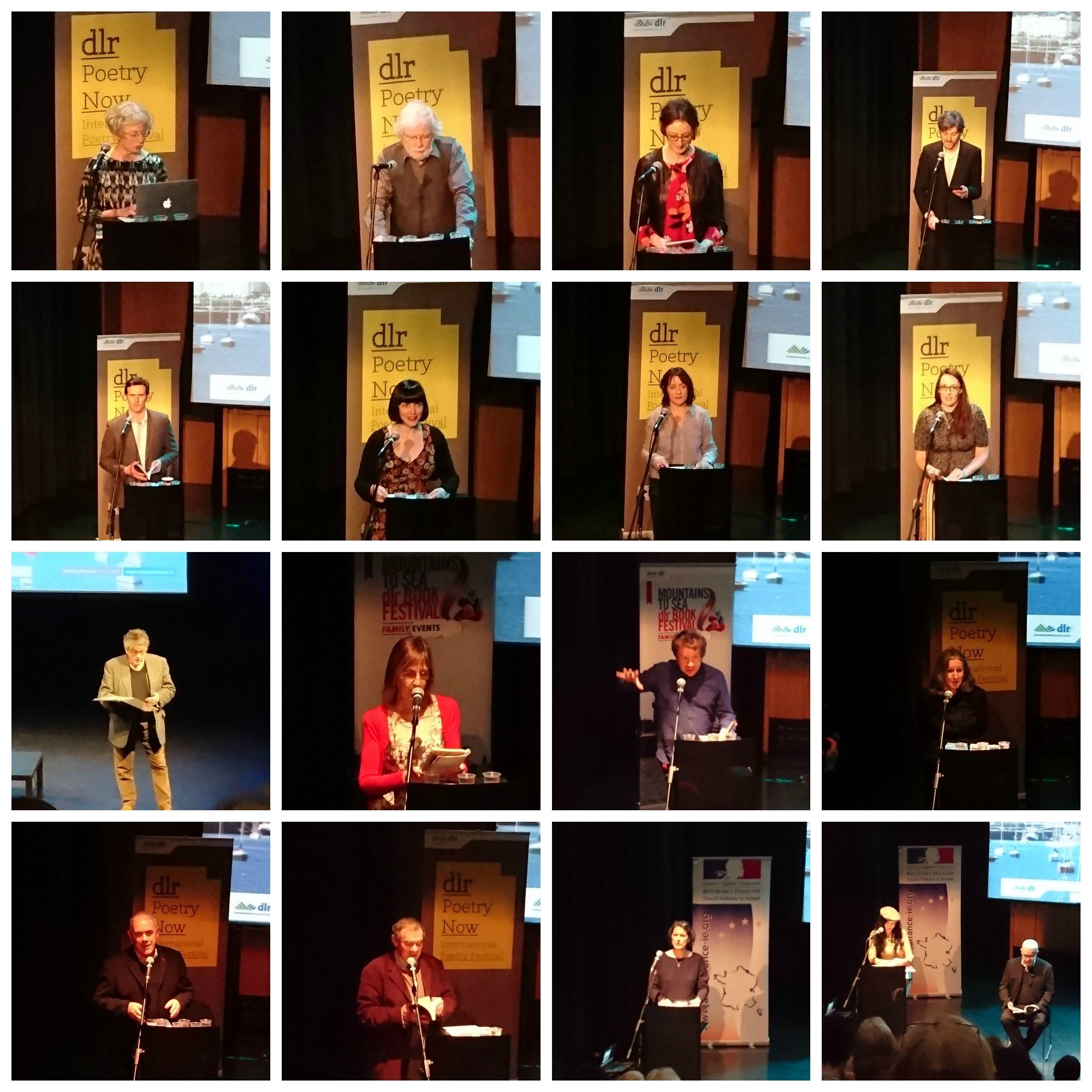Poetry Now at Mountains to Sea dlr Book Festival 2016
Last weekend’s Mountains to Sea dlr Book Festival 2016 saw the lights of the literary world, in Ireland and beyond, descend on Dun Laoghaire to inform, inspire and entertain. Headstuff Poetry Editor, Angela Carr, was there, taking it all in.
Saturday Morning
‘Instead of going around the room and listing our accomplishments, which can sometimes be quite intimidating, let’s introduce ourselves and share one thing that we have difficulty with in our writing.”
It’s Saturday morning at Mountains to Sea and I’m taking a poetry workshop at the LexIcon library complex with Derry-born poet, Colette Bryce, whose most recent collection, The Whole and Rain-domed Universe (Picador), was shortlisted for the Costa and Forward poetry prizes in 2014.
Her first instruction is met with a collective sigh of relief and we begin from a place of shared vulnerability and mutual understanding. It’s a deft move.
There are 10 of us in the room and the worries are all too familiar: coming up with a good title, finishing a poem, creating new work, knowing when to leave out, what to leave in.
We spend the next two hours listening to each poet in turn, teasing out their ideas and flagging the things that we, as writers, are often too close to our work to see. Bryce is a calm, informed, down-to-earth presence, drawing lessons from each poem we read and I leave the session energised by the flow of ideas.

From the workshop, we skedaddle down to the LexIcon’s Studio theatre for the Irish Times Poetry Now Award, introduced by festival curator, Alice Lyons — we’ve just found out on Twitter that this year’s winner is Geis by Caitríona O’ Reilly, published by Bloodaxe Books. Geis is O’Reilly’s third collection, and faced stiff competition from fellow nominees Eiléan Ní Chuilleanáin, John F. Deane, Doireann Ní Ghríofa and Medbh McGuckian, for this year’s award.
Judges Colin Graham and Gerard Smyth describe their decision as unanimous and the collection as: “an outstanding achievement… intense, intelligent and finely-crafted poetry which is both self-examining and dazzled . . . by the word and the world’s beauty.”
Caitríona reads, taking us through the sensual wordplay of Ovum, the opening poem, the personal and ancient mythologies, in a language of insects, feathers and bone, to the exultant final poem, Komorebi (from the Japanese, meaning ‘sunlight filtering through trees’), with its ‘cormorant extending his wet wings to it/ in a messianic gesture/as if dazzled’, as we are, listening.
Saturday Afternoon
A bite of lunch, a breath of fresh sea air and it’s back into the Studio for readings by Doireann Ní Ghríofa and Martin Dyar, introduced by novelist and short story writer, Rob Doyle.
I’ve heard both Martin and Doireann read several times, each time struck afresh by their talent. Both are highly regarded poets. Dyar’s debut collection Maiden Names (Arlen House, 2013) was shortlisted for both the Pigott Poetry Prize and the Shine/Strong Award. Ní Ghríofa, a bilingual poet writing in both Irish and English, was awarded the Ireland Chair of Poetry Bursary 2014-2015. Her most recent collection, Clasp (Dedalus Press, 2015), her first in English, was nominated for this year’s Irish Times Poetry Now Award.
Dyar’s poems present as a series of monologues by characters who inhabit Everytown, Ireland. From The Group Scheme engineer visiting a woman whose son drowned, ‘She watched me strike the pipes. I sensed/then a son beneath us, sinking or waiting,/disturbed and now dislodged’, to the wandering amours Margaret and Tony, ‘Affairs. On both sides. Wedding off’, to the alcoholic Irish Cyrano de Bergerac: ‘I’m dying in this town. I’m lost. I’ve never had a woman.’ Each voice, authentic and complete. He ends with a touching tribute to friend and musical collaborator, Conor Walsh, who died the day before.
Ní Ghríofa’s poems are visceral, even surgical, unpicking the threads of our bodies and shining a clear white light on what it is to be both human and woman.
Today, she reads predominantly new work: a saucy poem, about a night she and her husband spent in her childhood bedroom, read in both Irish and English (she apologises to her parents in the audience beforehand); the epic five-part, Letter to the Stranger who Will Dissect my Brain’, stunning in both language and ambition, and the tender, While Bleeding, a poem featured in POETRY Chicago’s New Irish Poets issue (September 2015).
Time for a cuppa and then it’s back into the theatre for the second of the afternoon’s readings, Colette Bryce and Frances Leviston.

Colette Bryce grew up in Derry and her fourth collection, The Whole & Rain-domed Universe (Picador), draws on those experiences, her childhood and her family, with insight and humour, ‘We walked to school, hand-in-hand, in twos and threes like paper dolls’, recalls passing through army checkpoints going to the beach in ‘North to South’, and childhood admonitions: ‘Don’t speak to the Brits, just pretend they don’t exist.’ Her poems are human, funny, accessible records of a difficult place at a difficult time — all the more startling for the deceptive simplicity of the language.
Frances Leviston‘s writing on the other hand is dense and scholarly, exploring history as a living force. She reads from her latest collection, Disinformation, published in 2015, and covers everything from Roman appropriation of Celtic myth, 10th Century Anglo-Saxon poetry — treats us to a verse in the original Anglo-Saxon tongue, sounds almost lost to the modern ear — the paintings of Titian, Amazonian shrunken heads, the ruins of ancient cities in Reconstruction. I want to sit with her work, take the words in slowly, spend time with them to know their worth.
Saturday Evening
The day ends with headliner, Paul Muldoon at the Pavilion Theatre, in front of a packed house and a starry audience that includes Paul Brady and Bono.
Muldoon, born in County Armagh — author of 12 books, noted academic, Poetry Editor at The New Yorker, winner of the Pulitzer, the Griffin, the T.S. Eliot, the Shakespeare and the Piggot Poetry Prizes, as well as musician and lyricist with the Wayside Shrines — is Irish Poetry Rock Star.
He is introduced by columnist, journalist and broadcaster, Mick Heaney, who recalls Muldoon’s close friendship with his father, his ‘habitual good grace‘ and lively presence at family occasions, including the luxury of dining out at McDonald’s in Grafton Street in the 1970’s, where he impressed the Heaney children as a ‘phenomenal listener‘.
Muldoon is in entertainer mode, peppering his poems with personal anecdotes and recollections as he takes us from Collegelands to Cuba, where a domestic drama unfolds against the backdrop of international tension, ‘Kennedy, almost an Irishman, so not much better than ourselves’; from Dublin Airport to the Ballygawley Roundabout in The Sightseers, a hole in the wall of a former New Jersey home on the Delaware and Raritan canal in The Loaf, and back to Havana, Cuba for his daughter’s twenty-first birthday.
Twelve hours of poetry and I’m nodding with exhaustion on the bus home, but my mind is churning with ideas, imagery, conversations with fellow poets I often only see at events like this, and the first flickering lights of new poems scribbled, almost illegibly, in the black notebook balanced on my knee.
Sunday Afternoon
My second day at Mountains to Sea kicks off with the The Shine / Strong Poetry Award, presented annually to the best first collection of poems published in English or Irish by an Irish poet in the previous year. The award is made in memory of Rupert and Eithne Strong and sponsored by Shine, the national organisation supporting the rights and needs of all those affected by mental ill health.
Judge, Kevin Barry, selected three collections for this year’s shortlist: Madelaine Nerson Mac Namara’s The Riddle of Waterfalls (Bradshaw Books); Connie Roberts’ Little Witness (Arlen House), and Breda Wall Ryan’s In A Hare’s Eye (Doire Press). We hear from all three collections — Nerson Mac Namara’s poems move between Ireland and France, speak of family, memory, history and nature; US poet Connie Robert’s poems of growing up in an industrial school in Ireland are authentic and harrowing (given a robust treatment here by former award winner, Dave Lordan, who read on her behalf), but it is Breda Wall Ryan’s In a Hare’s Eye that takes the prize.
Barry, whose thoughtful introduction describes how the poems in these collections brought light to ten solid weeks of rain in Sligo this winter, describes her (affectionately) as a ‘white witch’. Winner of the iYeats, Dromineer, Over the Edge New Writer of the Year and Gregory O’Donoghue poetry prizes, Wall Ryan has firmly made her mark on the Irish poetry scene, with poems that explore the myth and magic of Ireland, bear witness to the lives of women through all her ages, and are by turns observational, meditative and musical.
A quick break and it’s back into the Studio for Theo Dorgan and Thomas McCarthy, introduced by Catriona Crowe, Head of Special Projects at the National Archive, Dublin.
Dorgan and McCarthy both emerged from the vibrant Cork poetry scene in the 1980’s — Dorgan, a native, McCarthy, studying at UCC and now resident. Theo Dorgan confesses it’s been 30 years since they read together as ‘baby poets’ back in the day; they’ll read together again at A Poet’s Rising, as part of the 1916 centenary celebrations, at the Irish Writers’ Centre on 31 March.
Dorgan’s poems deal with love and loss, mythology and the sea, whether pondering the ghosts of 1916 at Kilmainham Gaol, the wet nurse who ensured his grandfather’s survival when his great grandmother died at sea, rounding Cape Horn in Walls of Green Water, the vagaries of holiday romances in Young Love, corresponding with Leonard Cohen while writing a response to CP Cavafy’s Ithaca, or confronting his own mortality in Learning Death. It is this poem, from his latest collection, Nine Bright Shiners (Dedalus Press) — a series of elegies for fallen friends and family — touching on the vulnerability of our humanity, that brings tears to my eyes in the dark of the auditorium.
Thomas McCarthy’s work is rooted in Irish history and politics, and poems like Question Time and Party Shrine are particularly relevant in post-election season. He reserves a special degree of invective and mischievous humour for one particular political party. ‘Five times in this life I tried to escape from Fianna Fail’, he declares in Dissident Poet, explaining after: ‘Fianna Fail is such garrulous and toxic material for poets.’ In An Anglo-Irish Luncheon Party he wrestles with a political landscape dominated by the Anglo-Irish and Fianna Fail, which he describes as being ‘trapped between a hard place and a diamond.’
One literary figure from this period looms large in his poems, novelist and playwright, Molly Keane, who McCarthy’s wife dubbed ‘The Older Woman.’ He talks of her letters to John Geilgud, directing one of her plays on the London stage in 1940; a blackbird hitting the window of her house in Last Flight and her friendship with Mrs Astaire and ‘the too-thin boy’, Fred, who gifts her a wrought-iron bench for her garden in Molly Keane’s Peach Champagne. Fred returns twirling Ginger Rodgers in Rebellion: ‘It should be just for this that young boys die.’
Theo Dorgan returns for the final poetry event of the day, and the festival, to read alongside Syrian-born poet, Maram al-Masri; he recently translated her latest collection, Barefoot Souls (Arc, 2015), into English. They are joined by Louisiana poet, Martha Serpas, whose work was adopted by The New Yorker to respond to Hurricane Katrina.

Both women, writing about a particular place and time, found their work resonating in unexpected ways; in her introduction, Siobhán Garrigan points out these poets did not ‘write to be relevant’ but rather were ‘accidental prophets’, who ‘knew how to grieve a city as faithfully as a parent or lover.’
Martha Serpas begins by describing her home as ‘the fastest disappearing land-mass on earth’, a fact exacerbated by Katrina. Rising water levels are everywhere in her poems: ‘The sadness is a surge carrying/all its debris back to you, a flood’, in The Dirty Side of the Storm, or The Water that ‘waits like a deckhand,/a persistent curl against the shore,/who won’t back down, take no, or be denied‘, interspersed with family reminiscences and small town lives, like the mother at Wal-Mart, ‘in shorts that/slice her thighs saying something/deep to him through her teeth,/her long hair smelling like she has/more than one job’
Masram al-Masri‘s poems from her latest collection are each presented in the same format — the name of the main character, their familial relationships (mother, daughter, wife), their age, their job — the mother dividing up possessions at the end of a marriage in Francoise; Madame Chevreaux, 75, and her snoring lover from salsa class; the devastating loneliness of Betty, whose life revolves around her cat, Kathleen.
al-Masri reads each poem in its original tongue, the meaning of her words lost in the veil of language, and I am carried along by the music of her voice, the rise and fall of intonation, mysterious and evocative. And, as I listen to the translations, her gentle, almost whispered words unfolding into living snapshots — some tender, some hilarious, some heart-breaking in their brutality — I feel a pang for all those other women around the world, their lives masked by unknown words, rolling out their truths in poems I would never read, never hear.

Headstuff would like to thank Alice Lyons, Marian Keyes, Brid Bolan and all the team at the LexIcon Library, Poetry Now and Mountains to Sea for access during the festival.
Featured Image: Dezeen.com
Author Images: Mountainstosea.ie
Festival Images: Angela Carr

